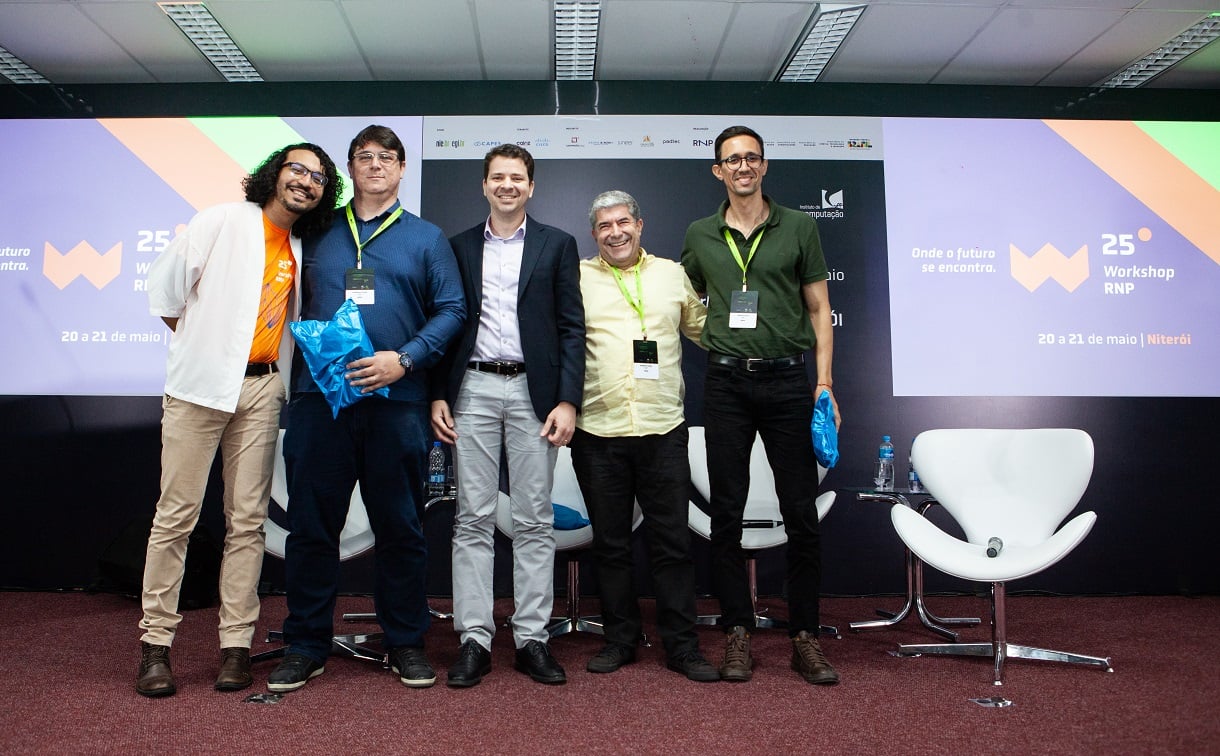25th WRNP debates advancement of new technologies for teaching and research
“We are building a high-performance network across this vast country that will connect very special points that can provide unique capabilities for our science and higher education.” The statement was made by Gorgonio Araújo, deputy director of institutional relations at RNP (National Education and Research Network), on the panel "e-Ciência Network and the Conecta program", on the first day of the 25th RNP Workshop (WRNP).
Held at the Computer Institute of the Fluminense Federal University (UFF), in Niterói (RJ), on May 20 and 21, the event brought together experts to discuss the main innovations in technology and its use in the area of education and research.
Conecta aims to expand the connectivity of educational and research institutions with greater security and quality. The e-Ciência network is one of the program's fronts, which will allow the flow of large volumes of data with speed and security.
“This is a network that is part of our infrastructure, with the capacity to integrate and communicate devices, facilities, supercomputers, laboratories, image processors and light. The future we are building is based on sharing,” explained Araújo.
Humberto Forsan, RNP's Information Security Engineering manager, spoke about the security mechanisms that are being included in the network and revealed that the process is challenging.
“We have to ensure that a threat does not spread into the network, since we have information exchanges. There are several separate aspects that we are unifying to see the best scenario and ensure that this information remains secure,” he highlighted.
The debate also included the participation of Jeferson Souza, specialist in support for RNP's e-Ciência network, and Aluizio Abrahao Hazin Filho, the institution's backbone coordinator.
In the panel "Cyberinfrastructure for Large Research Projects", experts discussed the cyberinfrastructure needed to support large research projects in the country. Amilcar Queiroz, coordinator of the BINGO radio telescope project, the largest in Latin America, believes that one of the greatest challenges is to prioritize the best initiatives and suggested the creation of an entity responsible for these choices.
“We need to have the courage to prioritize, especially when we are talking about large projects. And one of our main proposals is a forum to orchestrate these large projects, formed by state entities, public managers and representatives of civil society. They would form a council to map and strategically prioritize large projects, in addition to assessing their level of maturity and advising them on resource and management training. RNP has a role to play in this formation”, he explained.
Ulisses Campoi Martins Rosa, coordinator of innovation promotion at the Ministry of Science, Technology and Innovation (MCTI), spoke about what the government can do to support the area of education and research.
“The first support is in research and development. Technology and innovation are essential, since the Internet of Things, artificial intelligence and automation are redefining the management of infrastructures on a large scale. Training is also important, especially in the area of cybersecurity. With the increase in the volume of data and cyber threats, it is essential to have a human resources training policy,” he said.
The panel also included the participation of Antonio José Roque da Silva, general director of the National Center for Research in Energy and Materials (CNPEM). He presented some of the major research projects in the country and spoke about the technical aspects of the initiatives.
The role of technology and scientific dissemination in society
On its last day, WRNP also reflected on the role of technology and scientific dissemination in transforming society. “It is a very important mission to take what is being discussed about science out into the world and connect it to it,” said Renata Feltrin, executive director of CI&T, during the panel “Connecting Communities and Transforming Societies.”
“We live in a networked society, which establishes a new dynamic of relationships between people. Information is distributed much faster. Only with technology and science hand in hand can we navigate in a complex world. We have to inspire curiosity in this nation, encourage critical thinking and empower citizens. Technology is not only the end, it is also a means of disseminating this information in a positive way”, she emphasized.
Open disclosure of data about internet connections
The WRNP also featured an international speaker. Christophe Diot, technical leader for network analysis at Google, discussed the evaluation of internet traffic data and the accessible dissemination of this information. In the panel, held jointly with the SBRC (Brazilian Symposium on Computer Networks and Distributed Systems), "Internet Performance Transparency and M-LAB", the expert also spoke about the MLab initiative, which performs this type of evaluation.
“One of the reasons we analyze the Internet is to make sure researchers understand how it’s used. The Internet is progressing because of this research data. MLab was created to analyze Internet traffic, store the information and make this data available to everyone,” he explained.
Diot's lecture was moderated by UFF professor Antonio Augusto de Aragão Rocha, UFRJ professor and member of the Brazilian Academy of Sciences (ABC) Edmundo de Souza e Silva and Daniel José da Silva Neto, systems analyst at the RNP Research and Development Department.
Access the content of the 25th WRNP
Over the course of two days, the 25th WRNP welcomed more than 300 people in person and around 3,000 online to discuss new technologies and challenges in the areas of education and research. There were more than 20 hours of programming that you can watch and rewatch on RNP's YouTube channel. The next edition of WRNP will be in Natal (RN), from May 26 to 27, 2025. See you then!
